We have all seen the impact that plastic has on wildlife and the environment on TV documentaries and in the media. We know that plastic bags are not biodegradable. They fly off rubbish heaps, get thrown from the windows of passing vehicles and are dropped on the floor by passers-by. They clog water infrastructures, float down waterways, and spoil the landscape. If all goes well, they end up in proper landfills where they may take 1,000 years or more to break down into ever smaller particles that continue to pollute the soil and water.
Take a look at what West Farleighs litter pickers collect on a monthly basis http://www.thefarleighs.co.uk/monthly_litter_pick.html - quite incredible!
Plastic bags exposed to sunlight for long enough become brittle, breaking into ever smaller pieces. The small fragments then mix with soil, lake sediments, are picked up by streams, or end up contributing to large oceanic trash deposits. Endangering and often killing our wildlife and marine mammals.
Finally, producing plastic bags, transporting them to stores, and bringing the used ones to landfills and recycling facilities require millions of gallons of petroleum, a non-renewable resource which can arguably be better used for more beneficial activities like transportation or heating.
Since the charge for a plastic bag was implemented in 2015, the impact can be read from our Government’s research https://www.gov.uk/government/publications/carrier-bag-charge-summary-of-data-in-england/single-use-plastic-carrier-bags-charge-data-in-england-for-2016-to-2017
But what can we do individually and what difference will it make?
Apart from lobbying shops, supermarkets etc to provide paper bags we can consider a personal ban on plastic bags.
I have made the decision to stop using plastic bagswhere possible and over a course of 12 months I believe I will have avoided using at least 500 plastic bags, following a friend’s example. Think how many we can avoid using if we all adopt a ban? Ok so it’s a bit fiddly at the check-out ensuring all the fruit and veg are together but I am sure it’s worth it – it’s how we used to shop. You could go to a farm shop or green-grocers who use paper bags.
You can also:
Switch to reusable bags made from renewable materials. Make sure you wash them regularly. If you do end up using plastic bags now and then be sure to recycle them.
Make your own
You can make pure 100% muslin bags, using 100% cotton you can knit, crochet or buy (or ask someone to do it for you) cotton dishcloths, scrubbers and washcloths. See below for patterns.
Let’s all do our bit and help save this wonderful planet for generations to come.
 Muslin shopping bags
Muslin shopping bags
Cost: about £1.98 137 cm (50” wide) per metre from Amazon for white muslin 100% cotton or alternatively you can by the bags from around £2.99 each.
First, cut the fabric into rectangles that are 17" by 27", which makes a finished bag 15" tall by 13" wide (with double hemming). You can make them bigger or smaller, though. (If any of the edges are excessively frayed, cut that off first before cutting to size.)
Then you need to hem any sides that are not on the selvedge edge (finished edge) to keep the whole thing from unraveling over time.
Next fold in half and pin - the right side is the bottom of the bag and the left is the top. Sew around 3 sides leaving the top to make a channel for the twine.
Once you've sewn the bag, make the channel for the twine by folding down and pinning the top edge.
All you need to do to finish the bag is to tie a knot in some twine, push a safety pin through it and feed it through the channel. Leave about 2 or 3 inches hanging out on each side and tie it in a knot. When you want to close up the bag, just do a slip knot.
_________________________________
Scrubs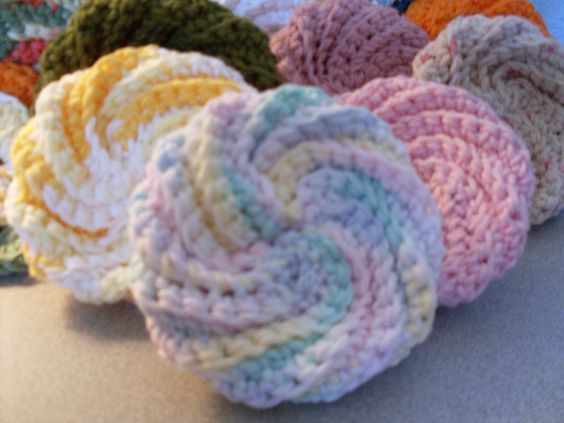
Materials:
100% Cotton Yarn
Size H Hook
Yarn Needle
Note: Leave a long tail at both the beginning and the end for weaving.Crochet in the back loop through the entire project
Chain 25
Row 1:
2 sc in second chain from hook, sc across to the last 2 chains, decrease using the last two chains, chain 1 and turn (25 stitches)
Row 2:
Decrease using the first 2 stitches, sc across to the last stitch, 2 sc in last stitch
chain 1 and turn (25 stitches)
Row 3:
2 single crochet in first stitch, sc across to the last 2 stitches, decrease using the last 2 stitches
chain1 and turn (25 stitches).
Repeat rows 2 & 3 for a total of 25 rows
To complete:
Lay piece out with beginning and ending tail at the bottom |
Fold bottom right corner over to the bottom left corner |
Foldtop left corner up to the top right |
With a yarn needle whip stitch together. Do not knot the end |
Now you have a tube |
Thread one of the long tails and into the yarn needle and weave it in an out along the edge |
|
|
|
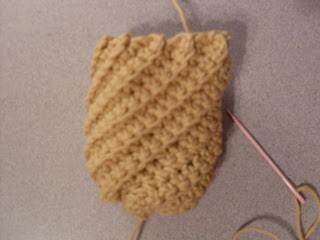
Once you have gone all the way around, pull the tail to gather the edge together. Push the needle up through the hole on the gathered end. Pull tightly, but be sure not to break the cotton by pulling too hard
|
Now weave around the open edge. When you have gone all the way around, Pull the tail to gather the edge together. The two ends will come together to form the spiral. You have to smooth and straighten the scrubby to form a nice circle.
|
Knot the two tails together tightly. Weave the tails in and cut.
|
Materials
Worsted weight, 100% cotton, approx. 2 oz in any colourr of your choice. Have fun! Use scraps in many different colours as an option.
J (6.00 mm) hook
Tapestry needle
Button
Special Stitch
FPSC – front post single crochet: insert hook (from the front) around the post of the dc in the row below. If you are left handed, you will insert your hook from the left to right around the post. If you are right handed, you will insert your hook from the right to left around the post. Finish your single crochet as you would normally.
Abbreviations
ch(s) | chain(s) | dc | double crochet | |||
sl st | slip stitch | FPSC | front post single crochet | |||
sp | space | |||||
sc | single crochet | |||||
hdc | half double crochet |
___________________________________________
SWEEPER COVER
The sweeper cover measures 10” x 4”. If you have a newer or older model, you can decrease or increase in multiples of three, just make sure to keep track of proper placement of the PFSC pattern in order to keep the wave stitch look.
Pattern
Row 1: Ch. 35. Work dc into the 4nd chain from the hook. Dc in each ch across.
Row 2: Turn, ch 1. FPSC around the first 3 dc, (1 dc in next 3 dc, 1 FPSC in next 3 dc), repeat to end.
Row 3: Turn, ch 3 (counts as first dc). Skip first FPSC, dc in next 2 FPSC, (1 dc in next 3 dc, 1 dc in next 3 FPSC), repeat to end
Row 4: Turn, ch 3 (counts as first dc). Skip first dc, dc in next 2 dc, (1 FPSC in next 3 dc, 1 dc in next 3 dc), repeat to end.
Row 5: Turn, ch 3 (counts as first dc). Skip first dc, dc in next 2 dc, (1 dc in next 3 FPSC, 1 dc in next 3 dc), repeat to end.
Rows 6 – 9: Repeat Rows 2 – 5 once.
Row 10: Turn. sc around edges, spacing stitches evenly across each side, working 3 sc into each corner.
Row 11: Join to first sc with sl st, ch 2. hdc across to last sc before corner sc begins. If you have skipped row 10, your row 11 will read: Turn. Ch 2, hdc across in each dc.
Row 12: Turn, ch 2 (counts as first hdc). hdc across to end, working last hdc into ch 2 of last row.
Rows 13 – 14: Repeat Row 12 twice.
Row 15: Turn, ch 2 (counts as first hdc). Hdc in next 12 hdc (13 hdc made).
Row 16: Turn, ch 2, hdc across
Rows 17 – 20: Repeat Row 16 four times.
Row 21: Turn, sl st to opposite edge of swiffer to appropriate 13 stitches. Fasten off.
Strap
Row 1: Turn and attach yarn with sl st to opposite side (Row 1). Ch 2 (counts as first hdc), hdc in next 12 hdc (13 hdc total)
Rows 2 – 6: Repeat Row 16 five times.
Row 7: (Buttonhole row): Turn, ch 2 (counts as first hdc), hdc in next 5 hdc, ch 1, skip next hdc, hdc in next 6 hdc.
Row 8: Turn, ch 2 (counts as first hdc), hdc in next 5 hdc, hdc in ch-1, hdc in next 6 hdc. Fasten off.
Sew the button in the 2nd row of the cover base. Slip on to your cleaner, button, and enjoy!
_______________________________
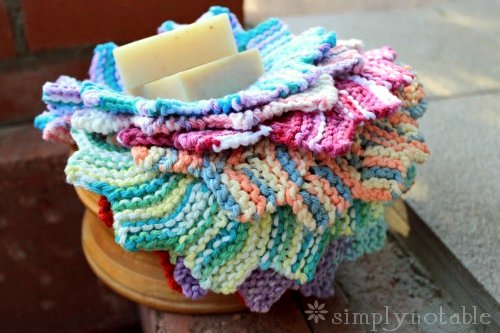 DISHCLOTHS
DISHCLOTHS
Cast On 14 stitches and knit back
1.Knit 4, yarn over, knit, leaving 2 stitches and knit back
2. Knit 4, yarn over, knit, leaving 4 stitches and knit back
3. Knit 4, yarn over, knit, leaving 6 stitches and knit back
4. Knit 4, yarn over, knit, leaving 8 stitches and knit back
Cast off 4 and knit to end – knit back (should be 14 stitches on the needle)
Repeat for 14 points
Leave enough yarn to sew sides together and go around circle and draw circle together. Tie ends in a double knot

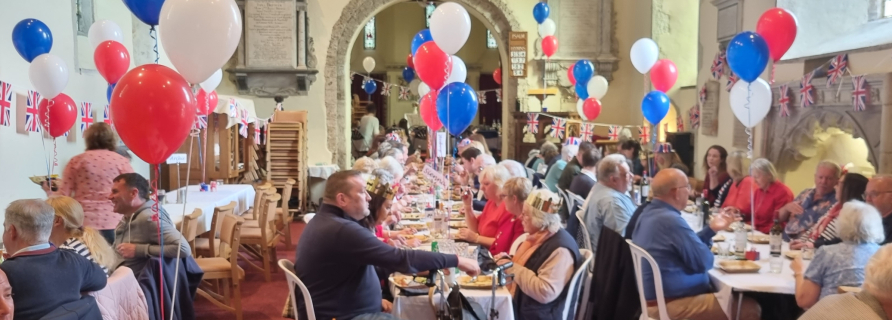
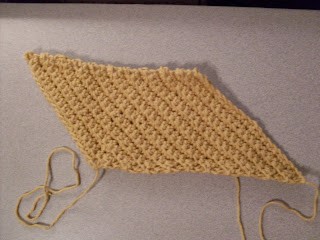
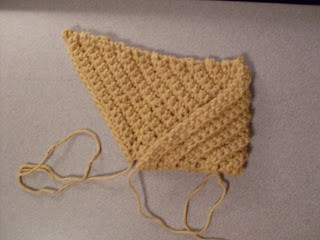
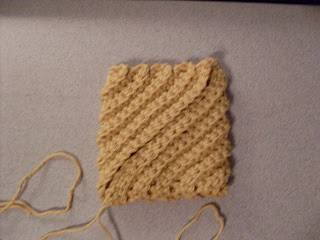
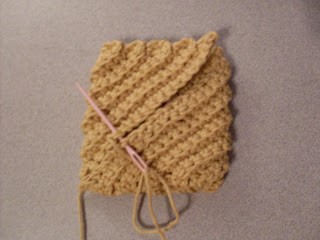
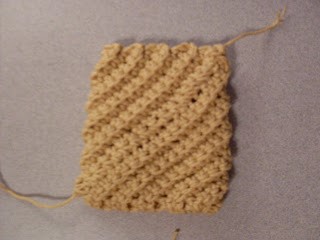
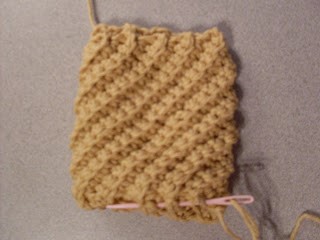
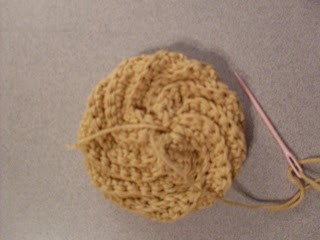
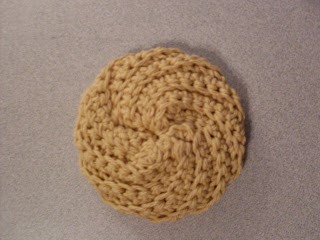





Make A Comment
Comments (3)
Just to chuck a spanner in the works plastic pollution is only one of the issues facing the oceans - overfishing, chemical pollution, climate change.......there's quite a long list
They are made from donated fabric and cost £2.50 each, of which I will donate £2 to the charity Involve Kent
If interested please call or text me on 07539 931240.